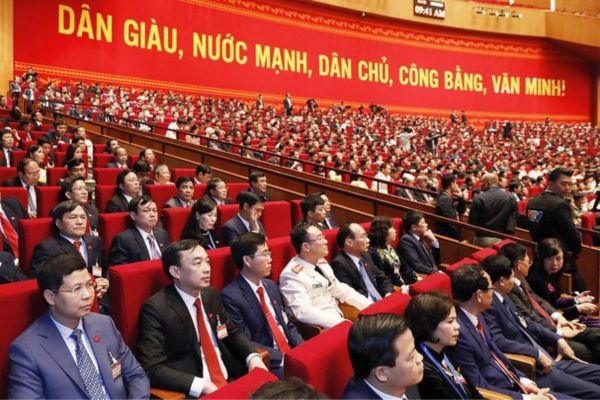The period for Communist Party Member's Self-Criticism in 2023: When Is It Conducted? Who Has to Prepare the Individual Self-Criticism Report?
When is the 2023 Party Member Review Conducted?
Based on Subsection 4.2 Section 4 Part A Chapter II of Guidance 21-HD/BTCTW 2019 which stipulates the organization of reviews within the Communist Party as follows:
CONTENT
A. SELF-CRITICISM AND CRITICISM REVIEW
4. Review Process
4.1. Preparing for the Review
...
4.2. Organizing the Review
- Annual reviews of Party members and the collective, individual leaders, and managers are conducted at the end of the year. The collective is reviewed first, individuals later; the leaders are reviewed first, followed by deputies and other members. The Party executive committee and the Party organization review after the leadership collectives of the government, professional associations, and mass organizations have completed their reviews. Party cells with organizing committees may review Party members at the organizing committee level, after which the organizing committee reports the results to the Party cell.
- The head or an authorized person presents the collective review report; each collective member provides feedback and clarifies individual roles and responsibilities about the collective’s strengths and weaknesses. The head summarizes and concludes each content to complete the report.
- Individuals present their self-review; each collective member provides feedback and criticism; the chair concludes the individual's strengths and weaknesses; the individual adopts feedback and finalizes their self-review. When reviewing the head, a deputy is assigned to chair. Party members holding leadership or management positions review their responsibilities and tasks at the respective place, and focus on reviewing Party member duties in the Party cell.
- The superior Party executive committee plans and forms teams to attend and direct reviews in places where reviews are suggested, and assigns members and officials from advisory boards to attend, direct, and summarize the review results in the subordinate Party executive committee, Party organization, and leadership collectives to report to the superior Party executive committee.
- The review period for the collective and individuals of the standing committees of the provincial Party committee, municipal Party committee, and Party committees under the Central Committee is at least 02 to 03 days; for places suggested for review by the Politburo and Secretariat, at least 03 to 04 days. Party delegations, Party committees, and central-level administrative leadership collectives have at least 01 to 02 days; for places suggested for review by the Politburo and Secretariat, at least 02 to 03 days. Provincial, municipal Party committees, and Party committees under the Central Committee set the review time for the collective and individuals under their management.
Thus, based on the above regulations, the review of Party members in 2023 will be conducted at the end of the year as stipulated.

When is the 2023 Communist Party Member Review Conducted? Who needs to create individual review reports for Party members? (Image from the Internet)
Who Needs to Create Individual Review Reports for Party Members?
Based on Subsection 1.2 Section 1 Part A Chapter II of Guidance 21-HD/BTCTW 2019, the subjects required to create individual review reports for Party members include:
- All Party members in the entire Communist Party (except those exempt from tasks and Party activities, and suspended Party members). Executive committee members who are suspended from executive duties still need to be reviewed.
- Leaders and managers at all levels.
What are the Evaluation Criteria Framework for Party Members?
Based on Subsection 2.2 Section 2 Part B of Guidance 21-HD/BTCTW 2019, the evaluation criteria framework is stipulated as follows:
(1) Regarding political ideology; moral qualities, lifestyle; sense of discipline; working style and manner:
- Political ideology: Loyalty to Marxism-Leninism, Ho Chi Minh's ideology, and the Party's renovation line; comply with, propagate, and mobilize families and people to implement the Party’s guidelines and the State's policies and laws; study resolutions, directives, and participate in political activities to enhance political stance and revolutionary perspective.
- Moral qualities, lifestyle: Results of studying and following Ho Chi Minh's ideology, morality, and style; preserving ethics, lifestyle, promoting the pioneer, exemplary quality of a Party member and maintaining close relations with the people; the spirit of receptiveness, listening, accepting to correct weaknesses and errors, and combating manifestations of bureaucracy, corruption, wastefulness, negativity; consciousness of building the local area, agency, unit and maintaining internal unity.
- Sense of discipline: Compliance with organization assignments; observing the regulations on things Party members are prohibited from doing and internal rules and regulations of the local area, agency, unit; principles and policies of Party activities, paying Party fees as stipulated; exemplary implementation of citizen obligations and regularly maintaining close contact with the local Party executive committee and Party committee.
- Working style and manner: Dynamism, creativity, determination in task execution; scientific and democratic working method, adherence to principles; cooperation spirit, support for comrades and colleagues.
- Results of combating manifestations of political ideology, morality, lifestyle degradation, “self-evolution”, “self-transformation” of individuals (if any).
(2) Regarding the results of fulfilling assigned responsibilities and tasks:
- Execution of duties and authority according to regulations (Party, government, mass organizations).
- Results of fulfilling assigned targets and tasks, quantified by products. For Party members who are officials and public employees, this includes clarifying the volume, quality, progress, and effectiveness of the targets and tasks assigned in the year; the spirit of innovation, creativity, accountability; service attitude to the people…
- Results of evaluating and ranking organizations, agencies, units under direct leadership and management; results of periodic confidence voting (if any).
(3) Implementation of the annual commitment to self-training, self-discipline, and striving
(4) Results of overcoming limitations and weaknesses identified in previous reviews concluded by competent authorities
(5) Results of reviews based on suggestions by competent authorities (if any)
LawNet